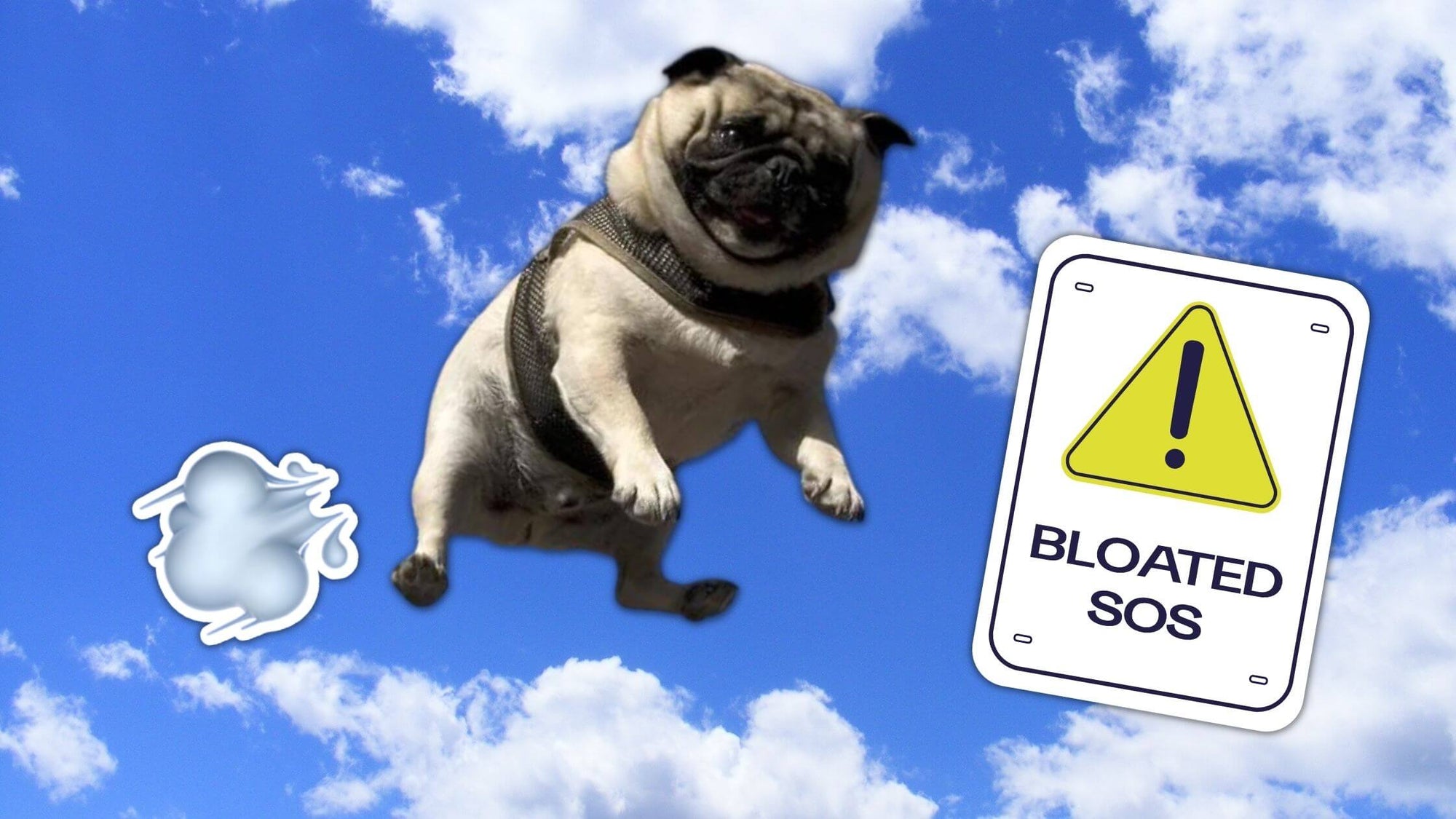Travelling is one of life’s many joys. It opens the door to endless opportunities that you would otherwise have missed if you’d stayed in your home country. It enables you to meet new people and make life-long friends, try new foods, experience new cultures, and see the world in all its glory.
However, it’s not all sunshine and rainbows. Travelling can be tough on your body and wreak havoc on your digestion, leading to excessive bloating and gas. Many long-term travellers find that their digestion worsens in the weeks following their departure from home. Although digestion often improves after a few weeks of travelling when you’re more settled into the whole experience, it can be uncomfortable and even painful to deal with until then.
In this article, we’re going to cover why travelling can wreak havoc on your digestion and some helpful lifestyle changes and dietary adjustments you can make to minimise travel bloat or plane bloat.
Why Does Traveling Cause Digestive Issues?
There are a couple of reasons why travelling causes digestive problems in many people.
Firstly, travelling often involves being sedentary for long periods of time, such as if you're on a plane or train for several hours. When you're physically inactive, blood flow to your digestive tract decreases. When there is less blood available to support the digestive organs in their essential functions and carry nutrients away from the intestines, your digestive processes slow down. Slower digestion means you're more likely to experience travel bloat (or plane bloat if this is your chosen mode of travel).
The second reason why travelling often leads to digestive disturbances is due to your change in diet, meal frequency, and fluid intake. When abroad, people's dietary intake tends to become a little less healthy and more indulgent. People choose the pizza instead of the salad, indulge in more cookies and chocolate, and consume more alcohol than usual.
Whilst there is absolutely nothing wrong with letting your hair down and indulging in your favourite treats when you're on holiday, doing so could cause you to experience issues with your digestion.
Holiday bloat is extremely common in those who drink alcohol because alcoholic beverages cause you to become dehydrated. Alcohol is a diuretic, meaning it increases your urine output and makes you go to the toilet more frequently. If you don't replace this additional loss in fluid by drinking more water, you could become dehydrated. This can slow your digestion down, leading to travel bloat and other digestive symptoms like indigestion.
Those of you travelling to third-world countries where public health measures are less stringent or non-existent are more likely to experience something known as travellers' diarrhoea. This is because you may consume food or drink that is contaminated with bacteria that affect your gut health. Generally, travellers’ diarrhoea affects those travelling to countries within Africa, Asia, Central and South America, and The Middle East.
5 Things That Cause Digestive Problems
So, why are people more prone to bloating when travelling? What are the most common things that cause digestive problems when you’re sitting in a car, on a train, or on a plane for extended periods of time?
There are five key things that we want to talk about when it comes to digestive problems when travelling, and those are:
- Being sedentary for extended periods of time
- Dehydration
- Changes in your diet
- Certain medical conditions
- Certain medications
Being sedentary for extended periods of time
Travel bloat is mainly due to you being sedentary and eating different foods than you usually do.
Being sedentary diverts blood away from your gut and makes your digestion less efficient. As a result, food moves more slowly through your digestive tract. When food sits stagnant in your colon, it gets fermented by your gut bacteria. The fermentation process releases gas, and more gas means more bloat!
Dehydration
Being dehydrated is one of the most common causes of constipation and bloating. Most people find that they’re looking for natural constipation-relieving methods and reaching for the laxatives in the cupboard to help them go to the toilet when, in fact, all they need is to drink more water!
When you’re chronically dehydrated, your body goes into overdrive and starts storing as much water as possible in an attempt to stay hydrated. This leads to water retention (oedema) throughout the entire body, most commonly in the digestive tract and peripheries (hand and feet).
Changes in your diet
You don't need to be travelling to experience diet-related bloating. In fact, a change in diet is the most common cause of digestive discomfort when travelling. Your body likes familiarity. If you're someone who usually eats the same sorts of foods, you could cause your digestion to go out of whack if you drastically switch your diet up.
Diet-associated travel bloat often comes about from eating lots of high-fat, high-salt foods. Fat and salt can disrupt your digestive processes and cause you to retain more fluid, leading to bloating and discomfort in your abdomen.
More specifically, if you go from eating lots of nutrient and fibre-rich foods like fruits, vegetables, and whole grains to eating a bunch of takeaways and junk foods, you're likely to get bloated. Junk foods are packed full of salt and saturated fat, both of which can increase fluid retention in the gut.
Similarly, you might eat less frequently but eat a higher volume of food at each sitting when you're travelling. For example, if you're sitting on a plane for several hours to travel to a distant country, you might only eat one meal during the travel period. But if this meal is a big one with a starter, main, and dessert, you might experience so-called plane bloat.
Changes in your diet can interfere with your digestive processes as a whole. You might find that you are gassier (i.e. you're burping more than usual) or get abdominal cramps when you eat unfamiliar foods when sitting in a car, on a train, or on a plane to travel far distances.
Certain medical conditions
We could write a whole article on the medical conditions and medications that cause bloating because there are so many. Bloating seems to be a symptom of pretty much every health condition out there (which emphasises how sensitive your digestive system is and why it’s so important to keep your gastrointestinal tract healthy).
Even if you’re usually able to manage your conditions quite easily, travelling can disrupt your usual behaviours. You might enjoy exercise as part of your medical management plan but are less able to move your body when you’re travelling for long periods of time.
If you usually rely on a nutritious and well-balanced diet to keep your chronic medical conditions in check, this might become difficult when you’re away from home and have to rely on whatever foods are available to you at the time. Often, the foods that are available ‘on the road’ or during a vacation are unhealthy and packed full of calories, saturated fats, salt, and sugar, all of which can worsen certain medication conditions, even when you only eat them in the short term.
You might find that you’re particularly prone to travel bloat if you have a gastrointestinal medical condition, such as any of the following:
- Irritable bowel syndrome (IBS)
- Inflammatory bowel disease (IBD)
- Coeliac disease and an intolerance or sensitivity to gluten
- Gastroesophageal reflux disorder (GORD)
- Nutrition absorption issues (malabsorption), which can be caused by coeliac disease, Crohn’s disease, ulcerative colitis, pancreatitis, liver disease, cholestasis, cystic fibrosis, Whipple disease, and Shwachman-Diamond syndrome
- Exocrine Pancreatic Insufficiency (EPI)
- Liver disease or liver cirrhosis
- Chronic kidney disease (CKD) or kidney failure
- Ascites, a condition where fluid accumulates around the abdomen, often due to liver-related issues or low blood albumin levels)
Certain medications
Some medications (not necessarily those used to manage the conditions above) can increase water retention and disrupt digestive processes, leading to bloating. Medications that can cause gas and bloating include aspirin, antacids, antibiotics, antidepressants, anti-diarrhoea drugs, birth control pills, anti-fungal medications, laxatives, non-steroidal anti-inflammatory drugs (NSAIDs), and statins.
You could find that your bloating worsens during travelling if you take any of these medications on a regular basis. If this is the case, use the following strategies to help manage water retention whilst you’re on the road (or in the sky, depending on your mode of travel).
How Can I Prevent Digestive Issues When Travelling?
If you enjoy travelling, you will be glad to hear that you don’t need to stop your adventures just because of your digestion. There are lots of ways to reduce bloating quickly and keep your digestive system happy when you are travelling.
Here are some of our top tips for tackling bloating, excess gas, and abdominal discomfort when you’re travelling:
- Stay hydrated whilst you’re travelling. Keep a reusable water bottle by your side and take regular sips of water throughout the day.
- Limit your consumption of caffeine and alcohol. If you want to have a coffee or glass of wine, make sure to drink more water to keep your body hydrated.
- Aim to get up and stretch your legs once every hour during long periods of travel to maintain good blood circulation around your body.
- Consider taking a probiotic supplement just before or after eating to support your naturally occurring gut bacteria. You can pair this with a digestive enzyme supplement for optimal and speedy digestion.
- Spread your meals and snacks more evenly throughout the day to prevent excessive food intake within a single meal. Doing so gives your digestive system time to process each meal properly before you eat again.
- Try to eat a healthy diet whilst you’re on holiday (as hard as this might be), focusing on lots of fruits, vegetables, and whole grains that support your digestion.
- Make sure to keep your pre-existing medical conditions in check, especially if you suffer from a digestive health condition like IBS or IBD.
- Ask your doctor if you can change to a different medication before you go travelling if you suspect that it’s your current medication causing your bloating.
- Address hormonal imbalances long before you’re due to go travelling. This might require you to speak to a specialist doctor or nurse to learn about healthy lifestyle and dietary changes you can make or medications you can take to restore hormonal balance in your body.
A Dose For Bloating - For Travel Bloat
A Dose For Bloating is your cure for travel and holiday bloat. At Wild Dose, we’ve spent a long time developing and perfecting our bloat-busting supplement to ensure it’s as effective as it can be for eliminating bloating and indigestion.
A Dose For Bloating combines two billion probiotic bacteria with seven digestive enzymes and seven plant extracts. Together, these ingredients improve your digestion, enhance your pre-existing gut microbiome, and keep bloating at bay.
If you have any questions about our supplement, head over to our contact page and get in touch with our team. We want to make sure our supplement is exactly what you’re looking for and will lead to the results you’re after, so don’t hesitate to ask us anything!









